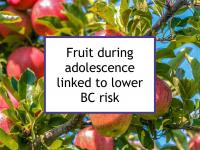Few studies have attempted to identify components of diet during the teenage and young adult years that linked to breast cancer risk in middle age or later adulthood. One of the strongest factors identified to date is adolescent drinking, which has been linked to subsequent breast cancer in several studies.
High adolescent consumption of butter and red meat also appear to increase breast cancer risk. On the other hand, high intakes of foods rich in calcium, carotenoids, dietary fiber, omega-3 fats, and vitamin D each have been found to be associated with reduced breast cancer risk. Now a new study has reported that fruit consumption during adolescence is associated with lower risk of breast cancer.
The risk reduction conferred by fruit intake is stronger for hormone receptor negative (ER-/PR-) than hormone receptor positive (ER+/PR+) disease.
Other adolescent breast cancer risk factors
Breast tissue is particularly vulnerable to carcinogens during adolescence since it represents a period of rapid proliferation and differentiation of cells.
The following non-dietary exposures during the teenage years and young adulthood have been reported to be associated with increased risk of breast cancer in adulthood:
- Cigarette smoking and exposure to second-hand smoke
- Repeated radiation to the chest or back to treat or follow progress in childhood cancer or scoliosis
- Exposure to light during regular sleeping hours
- Use of birth control pills or other types of hormonal contraception, especially before age 20
- Use of estrogenic herbal supplements designed to regulate menstruation
- Use of pills or creams designed to increase breast size
- Use of personal care products and cosmetics containing parabens, placenta or hormones
- Exposure to harmful chemicals (including bisphenol A (BPA), styrene, and phthalates) that can leach from plastics
- Exposure to household insecticides containing lambda-cyhalothrin.
Latest research finds adolescent fruit consumption could lower risk
The prospective study referenced at the beginning of this news story was designed to investigate the links between breast cancer risk and fruit and vegetable intake during the teenage years and young adulthood. The study was based on data from women in the Nurses’ Health Study II, including 90,476 premenopausal women aged 27-44 who completed a diet questionnaire in 1991. Data was also used from women who completed a questionnaire concerning their adolescent diet in 1998 (a total of 44,223 of the original participants).
A total of 3,235 cases of invasive breast cancer had been diagnosed among participants by 2013, of whom 1,347 had completed a questionnaire about their diets during their teenage years (ages 13-18).
Total fruit consumption during adolescence was found to be associated with lower risk of breast cancer. Teenage girls in the highest fifth of fruit consumption (a median of close to three servings per day) had a 25% lower risk of breast cancer than those in the lowest fifth (a median of half a serving per day). The risk reduction conferred by adolescent fruit intake was found to be stronger for ER-/PR- than ER+/PR+ disease.
No association was found between total fruit consumption in early adulthood and breast cancer risk. Nor was total vegetable intake in either adolescence or early adulthood found to be associated with breast cancer risk. However, early adulthood intake of fruits and vegetables rich in alpha-carotene was found to be associated with lower risk of premenopausal breast cancer (18% lower risk for the highest intake (median 0.5 servings per day) compared to the lowest (median 0.03 servings per day) intake).
When intakes of individual fruits and vegetables were analyzed, the authors found that higher consumption of apples, bananas, and grapes during adolescence were significantly associated with reduced risk of breast cancer.
In addition, intake of oranges and kale during early adulthood were also found to be associated with lower risk. Fruit juice consumption was not found to be associated with risk in either period.
The authors conclude that higher fruit intake is associated with lower risk of breast cancer. The study results demonstrate that food choices during adolescence could be particularly important.
Please see our article on protecting our daughters from breast cancer during the teenage years and young adulthood for more information.
